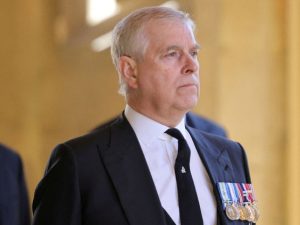The Queen’s untimely lapse of judgment over Prince Andrew

by Conrad Black
The abandonment of Prince Andrew, the Duke of York, to the frenzied posthumous assault upon Jeffrey Epstein, in which all the many Canadian and other institutions and organizations that benefited from the Duke’s patronage have participated, is a disgrace. For the Queen to have withdrawn from him all of the dignities exercised ex officio for centuries by the second son of the reigning monarch is not remotely justified by the almost irrelevant and inevitable fact that the Duke has been sued by a former companion of Epstein’s and an American judge has declined to dismiss the charge in pre-trial proceedings. No doubt many American prosecutors are well-intentioned and honourable people who are respectful of the rights of those whom they investigate and even indict. But a very large number of them could not be so benignly described. Because the plea-bargain system enables prosecutors to extort inculpatory testimony through their ability to grant immunity to witnesses and also to threaten uncooperative witnesses with obstruction of justice, and because they enjoy what amounts to an absolute legal immunity for anything they do in their official capacity, there is a large number of American prosecutors who, in Britain or Canada, would be disbarred for activity they engage in routinely.
The Epstein case — which is full of sex, money and prominent people such as the Duke of York and former U.S. President Bill Clinton — is precisely the sort of litigation that attracts the worst type of American litigator, civil and criminal: the absolute dregs of American legal careerism. Epstein’s case has become notorious, and even infamous, but he has only ever been convicted of what he pleaded guilty to in 2008. No one could be a more inviting target for such scurrilous abuse of the legal system than a prominent member of the British royal family.
The recent trial of Epstein’s long-time girlfriend, Ghislaine Maxwell, reminded the observant of many of the frailties of the American criminal justice system. Maxwell’s lawyers argued that individual witnesses were incentivized from the Epstein victims’ fund. There is also the problem of a juror having been a molested minor who loquaciously held forth on this subject at some length in the jury room, in a manner that may have prejudiced deliberations; a judge is considering declaring a mistrial. All we have to go on in terms of actual verdicts on the basis of any findings that included a recognizable version of due process are what Epstein pleaded guilty to 14 years ago, which has absolutely nothing to do with the Duke of York, and whatever may survive the appellate process in the Maxwell case, none of which implicated the Duke of York.
I accept that Jeffrey Epstein and Ghislaine Maxwell, both of whom I knew in innocuous contexts, may have recruited underage women for sexual purposes, and that is a serious offence. But none of this has the slightest connection to the Duke of York. This is not only a justice system in which the prosecutors can extort virtually any evidence that they seek, regardless of its veracity; the constitutional guarantees in the Fifth, Sixth and Eighth Amendments of the Bill of Rights guaranteeing a grand jury as assurance against capricious prosecution, due process, no seizure of property without fair compensation, an impartial jury, swift justice, access to counsel of choice and reasonable bail, were all put to the shredder decades ago, resulting in conviction rates of upwards of 93 per cent, 95 per cent of those without trial — the infamous plea bargains. Civil cases with criminal implications like the charge against the Duke of York are no more reliably adjudicated. This is why the United States has less than five per cent of the world’s population and 25 per cent of its incarcerated people, and why it has six to 16 times as many incarcerated people per capita as other comparable countries: Australia, Canada, France, Germany, Japan and the United Kingdom. (These are all prosperous and sophisticated democracies and although they are less populous countries, their total population is larger than that of the United States.)
The world is witnessing a serious injustice being inflicted upon a prominent scion of the world’s senior monarchy, against whom there is not one scintilla of probative evidence that would be accepted as relevant in a Canadian or British court. No one who has ever set foot in the United States can be absolutely assured of not becoming a victim of its prosecution service or litigation industry, but there is no excuse for over-compliance by foreigners with its abusive excesses. No country that has a serious criminal justice system, including Canada and the United Kingdom, should have an extradition treaty with the United States — the people its lawless prosecutors indict are effectively extradited straight into the bloated and corrupt American prison system. But in this case, the Duke of York had every right to expect the support of his countrymen and especially of his own family.
Britain is a country that does respect the presumption of innocence of accused people and it is shocking that so distinguished a monarch as Queen Elizabeth II would submit to the hare-brained and unworldly advice of those who counselled her not only to attach a completely undeserved degree of credence to these so far unfounded allegations, but to put her own son over the side, prejudged and apparently abandoned by his family. Prince Andrew was unwise in associating as closely as he did with Jeffrey Epstein. But there has been no lèse-majesté and damn little noblesse oblige. This is the only negative comment I have ever made about that most distinguished monarch, Her Canadian and Britannic Majesty, the Queen. She will have reigned 70 years next week; this an untimely lapse of judgment.
First published in the National Post.